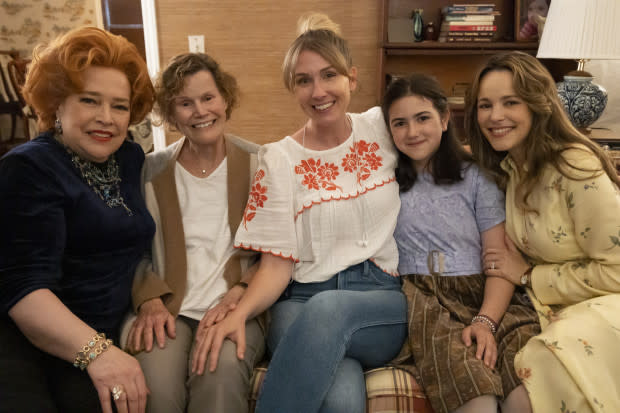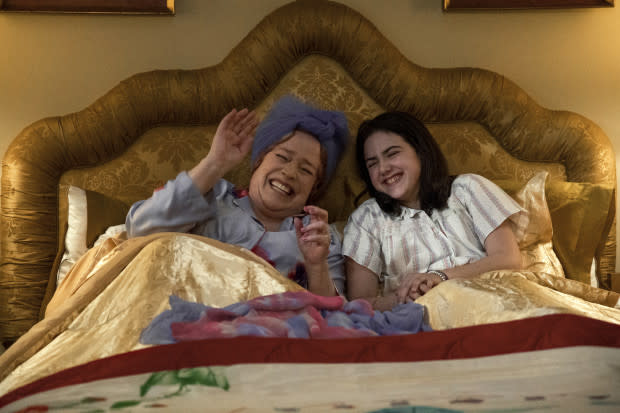Why Kathy Bates Recently Threatened to Quit Acting
- Oops!Something went wrong.Please try again later.
Kathy Bates may be in what she calls her "third act," but the curtain isn't coming down on her career any time soon—even if she occasionally thinks it might.
“Last year, I had gone through a difficult experience with a film, and I just thought, ‘Oh, that's it. I'm done,’” Bates, who is currently shooting a movie in North Carolina with Diane Keaton and Alfre Woodard, tells Parade. “And then all of a sudden, all these opportunities popped up. And that's sort of been the way that it's been for me for years.”
Her latest opportunity came straight from the pages of Judy Blume's groundbreaking novel Are You There, God? It’s Me, Margaret. Like the 1970 book, writer/director Kelly Fremon Craig’s film adaptation centers around a young girl named Margaret (Abby Ryder Fortson) who is navigating puberty in a new suburban school after moving away from New York City and her adoring grandmother, Sylvia (Bates). She and her friends talk about getting their periods and wearing bras—things that, at the time the source material came out especially, were considered embarrassing or taboo.
"I hope the film will open people's eyes and help young women face these changes that are happening in themselves and know that it's normal, and that it's not so fearful,” Bates says.
Related: All About the Are You There, God? It's Me, Margaret Film Adaptation
Ahead, the Oscar-winning actress talks about how the movie got her thinking about her mother, why she sometimes wishes she were a man in Hollywood and more.
What was it about the script that drew you to this project? Was it a book that you had a special connection to?
I didn't really know the book until I read it in preparation for the film. In 1970, I was very much focused on my training as an actor and then a couple of years after that, I was living in New York and I remember we were taking a bus down to protest the war in Vietnam—so it really wasn't on my radar. It's just a fantastic film. I think maybe the mother-daughter relationship reminded me of my mother and how she gave up so much.
I came along very, very late in life for her. She was born in 1907, and when she came along, she didn't have much opportunity except to stay married and raise kids. I came along unexpected and not planned for and not really wanted, and I understood that as I got older.
Watching the movie was very emotional. It made me wish that my mother was there with me and that it would somehow fill her with joy and repair some of the difficulties we had when I was growing up. I certainly wouldn't have been sitting here on the phone talking to you today if my mother hadn't given up so much for me to make my dream of becoming an actor come true. And I don't think I have given her the credit that she deserves for that and so I'm happy I'm able to talk to you about it today.
So it was that mother-daughter relationship that drew you to this project?
Yes, it was the three generations, really. Talking to our wonderful director, Kelly Fremon Craig, [that] was very much something that she created in the writing of the script—that there were these three generations of women who were changing in the way women do.
Certainly, I'm in the third act. And then when you're younger, like Rachel [McAdams, who plays Margaret’s mother in the movie]—although, I didn't have kids. But my characters were kind of my kids, I guess. I never thought about [it] that way. But I certainly chose not to have children. I didn't want that.
How were your characters like your children?
Well, I guess because that's where I've put my love and care and passion in developing and evolving and studying and nurturing. But I hasten to say they're not real children. They're make-believe children.
I love your character in this film. Did you work with Judy to bring Sylvia to life?
I did a little bit. Yes, I talked to her about the accent, and she was very determined that she didn't want it to be very New York. She wanted it to be more generic, American.

Dana Hawley
And I wrote some letters to Abby [who plays her granddaughter]. I realized that she would be shooting ahead of me for a couple of weeks at camp and stuff, so I decided with their permission and Kelly's permission, that we could write each other letters, like grandmother and granddaughter would. That really helped us and helped me a lot because my letters were really kind of a Bible, if you will, for my character. We made up things that had happened to us, that we had shared, like trips to the Plaza Hotel and how we went to Central Park with her grandfather and she couldn't pronounce his name, so she called him Gumps. We made up all these little things that would anchor us in our relationship and it was so much fun.
We shared those with Judy afterwards. She's just amazing. What a treat.
I can imagine. You're both icons.
Well, I haven't sold 90 million copies of books [laughs]. And really, I mean, look at how she's changed young women's lives. It's huge.
Related: Why Judy Bloom Is As Relevant Today As Ever
Do you think that it was easier to be young back then versus today, because while the themes of the film are very relatable, it does show how different growing up in the '70s was compared to today with social media, the internet, this digital age…
I don't know. I'm perplexed about what it's like to grow up now. I think in some ways it was—well, certainly less hectic, that's for sure. But I don't think I knew what was what. I didn't know anything about the birds and the bees. My parents were quite old when I grew up and they didn't teach me about sex, really. I didn't know any boys and I hadn't had sex and didn't have sex until I was in my 20s. I think we were very conservative in my household, until I sort of broke out and became the black sheep.
There are moments in the film where Rachel [tells her daughter Abby] like "welcome to womanhood" and Abby at the end declares she's finally a woman. What does being a woman or womanhood mean to you?
Being a woman, you mean in going through life as a woman?
Exactly.
Well, I guess I'm kind of conflicted about that. There have been many times that I wish I'd been born a man, especially in my profession, because there's so many more parts for men. It's really that simple. And it's very frustrating, because men were always working and there were only a few parts in a piece for women. I remember talking to Helen Mirren about this, that that's the way it is. And so many times I've wanted to be a man or play the wonderful parts that are written for men. I mean, who wouldn't want to play Henry III? These great roles.
Since I was the third daughter, my mother used to joke that they were gonna have to get a room at the hospital for my father because he had a third daughter instead of a son. And so my father, he taught me how to mow the grass and work with tools. So there's part of me that sort of feels like I was that son in a way; there is that masculine side to me.

Dana Hawley
As you pointed out, the movie shows three generations of women changing. It's a coming-of-age story that centers around Margaret, but it feels like a coming-of-age story for all ages. Do you ever have moments where you feel like you're still coming of age?
Yes, I do. I mean, I don't know that I always like the age I'm coming to. Sometimes it's a struggle to make peace with that and I find myself saying, "Oh gee, I hope I'm gonna stay in good health enough to do this, that and the other.” And I've had cancer twice, [so] sometimes I'll get aches and pains and I'll think, "Oh dear, you know, is this gonna be Act III of cancer?" But in terms of my work, I find myself evolving every day. And I've spent 50 years perfecting and working and practicing at my craft, and it gives me tremendous joy to be able to succeed and to do a good job and to be a wonderful character actor. That's what I've always wanted to be, is a character actor. I've been so very lucky. That's what I say to myself every day. How lucky I am. How grateful.
You know, sometimes, like last year, I had gone through a difficult experience with a film, and I just thought, "Oh, that's it. I'm done." And then all of a sudden, all these opportunities popped up. And that's sort of been the way that it's been for me for years. Because sometimes I think, "Is this really worth something? Does this really help people?" And then I think during the pandemic, we all answered that question. Because everybody was able to go to their TVs and distract themselves.
When you were initially thinking “maybe I should take a step back,” which was the film that made you think that?
Oh, I knew you were gonna ask me that. And I don't think I want to answer that question out of respect for them. But you go into projects and you have such high hopes and you realize as a film actor, you really don't have any control over how they edit it, and it's very frustrating. And you have to come to grips with it. But sometimes, there are films that you just give everything [to], and then they take what you've given them and they ruin it, and there's nothing you can do about it. And it really knocked me off my beam.
I could tell you something funny about it. [After] I swore to my agent—I said, "That's it, I'm done; I'm out of here"—I got offered this Matlock pilot [from CBS, which also stars Jason Ritter]. They called me one Friday afternoon. They said, "Listen, they're doing a pilot of Matlock. You have to read the script. You have to let them know by Monday."
So I hung up and I was kind of grumpy and gruff [from the bad film experience]. And there I am, sitting, looking at my watch. Why haven't they sent a script yet? [Laughs.] So it's like, so busted. It's like, you want to do it. If you're an actor, it's your life force. It's what you were made to do.
Are You There God? It’s Me, Margaret opened in theaters April 28.
This interview has been edited and condensed for length and clarity.
